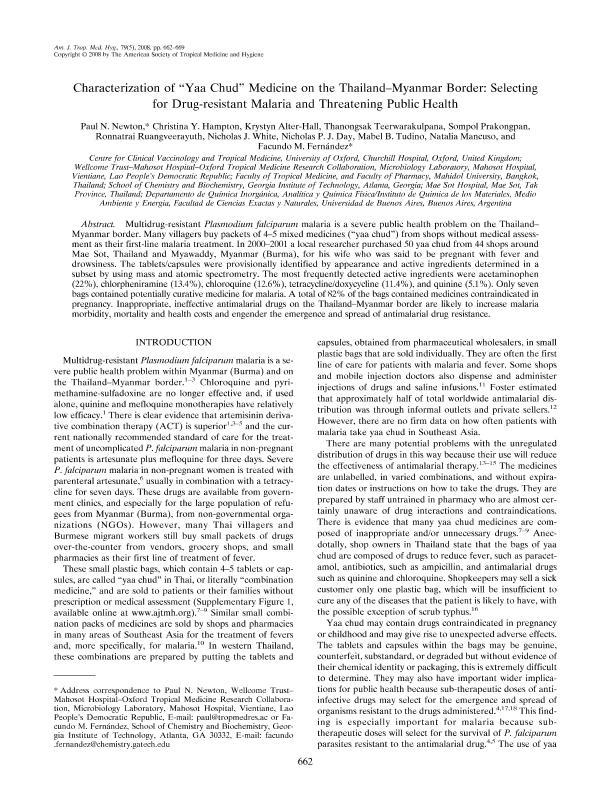Artículo
Characterization of “Yaa Chud” Medicine on the Thailand–Myanmar Border: selecting for Drug-resistant Malaria and Threatening Public Health
Newton, Paul N.; Hampton, Christina Y.; Alter-Hall, Krystyn; Teerwarakulpana, Thanongsak; Prakongpan, Sompol; Ruangveerayuth, Ronnatrai; White, Nicholas J.; Day, Nicholas P. J.; Tudino, Mabel Beatriz ; Mancuso, Natalia; Fernández, Facundo M.
; Mancuso, Natalia; Fernández, Facundo M.
 ; Mancuso, Natalia; Fernández, Facundo M.
; Mancuso, Natalia; Fernández, Facundo M.
Fecha de publicación:
11/2008
Editorial:
American Society of Tropical Medicine and Hygiene
Revista:
American Journal of Tropical Medicine and Hygiene
ISSN:
0002-9637
Idioma:
Inglés
Tipo de recurso:
Artículo publicado
Clasificación temática:
Resumen
Multidrug-resistant Plasmodium falciparum malaria is a severe public health problem on the Thailand-Myanmar border. Many villagers buy packets of 4-5 mixed medicines ("yaa chud") from shops without medical assessment as their first-line malaria treatment. In 2000-2001 a local researcher purchased 50 yaa chud from 44 shops around Mae Sot, Thailand and Myawaddy, Myanmar (Burma), for his wife who was said to be pregnant with fever and drowsiness. The tablets/capsules were provisionally identified by appearance and active ingredients determined in a subset by using mass and atomic spectrometry. The most frequently detected active ingredients were acetaminophen (22%), chlorpheniramine (13.4%), chloroquine (12.6%), tetracycline/doxycycline (11.4%), and quinine (5.1%). Only seven bags contained potentially curative medicine for malaria. A total of 82% of the bags contained medicines contraindicated in pregnancy. Inappropriate, ineffective antimalarial drugs on the Thailand-Myanmar border are likely to increase malaria morbidity, mortality and health costs and engender the emergence and spread of antimalarial drug resistance.
Palabras clave:
DRUG RESISTANCE
,
YAA CHUD
,
MYANMAR EPIDEMIOLOGY
,
MALARIA
,
THAILAND EPIDEMIOLOGY
Archivos asociados
Licencia
Identificadores
Colecciones
Articulos(INQUIMAE)
Articulos de INST.D/QUIM FIS D/L MATERIALES MEDIOAMB Y ENERGIA
Articulos de INST.D/QUIM FIS D/L MATERIALES MEDIOAMB Y ENERGIA
Citación
Newton, Paul N.; Hampton, Christina Y.; Alter-Hall, Krystyn; Teerwarakulpana, Thanongsak; Prakongpan, Sompol; et al.; Characterization of “Yaa Chud” Medicine on the Thailand–Myanmar Border: selecting for Drug-resistant Malaria and Threatening Public Health; American Society of Tropical Medicine and Hygiene; American Journal of Tropical Medicine and Hygiene; 79; 5; 11-2008; 662-669
Compartir
Altmétricas



